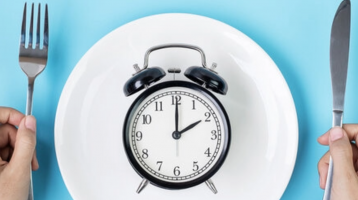What is Chronodiet®?
Do you want to lose weight without counting calories, joining a club or eating only liquid foods? Are you looking for a method that promises lasting success without any yoyo effects? Do you also want to lose weight quickly and slow down the aging process at the same time? Or do you simply want to follow a healthy, balanced diet that is also easy to integrate into your daily life?
The solution: Chronodiet® which helps you get closer to your desired figure while at the same time doing something for your health, without having to give up your favorite foods.
Chronodiet® is a long-term lifestyle concept that helps you optimize your weight and align your biological processes with the respective times of day. For example, meals are adjusted to the body’s natural rhythms, that is, when the body can optimally absorb and process certain foods. Enjoyment and variety are guaranteed at every meal.
How does Chronodiet® work?
Healthy eating means one thing above all: eating according to your internal clock! Certain biological rhythms throughout the day require different foods at certain times. Therefore, it is not only crucial how much we eat, but rather WHEN we eat WHAT.
The most important basic rule is: 3 meals a day is enough!
There are only three meals a day: breakfast, lunch and dinner. No snacks are allowed. Be careful: five to six hours should elapse between meals. In this way, the blood sugar level can drop after meals. In addition, for the long night, the metabolism resorts to energy from fat deposits. Only in this way can the body attack and demolish deeply stored fat reserves.
What can be eaten at what meal?
The key to success, however, is not only to follow the basics of Chronodiet®, that is, when to eat or not to eat something. What you eat at each meal is also important, because sugars, fats and proteins are processed differently by the body at different times of the day.
Breakfast:
Breakfast is the most important meal of the day, forming the basis of how the body’s metabolism works throughout the day. Do not skip it, because most of the daily nutrition is best consumed at the beginning of the day. To start the day well, we need carbohydrates in the form of sugar and starch at breakfast. To avoid unnecessarily high insulin spikes, sugar should be taken only slowly. Therefore, it is preferable to choose whole grain products. Sweet and vegetarian sauces, fruits, muesli and sweets are also allowed. However, animal proteins such as milk, eggs, sausages or cheese are a hindrance, so they should be avoided.
Lunch:
Everything is allowed at lunch, both proteins and fats and carbohydrates. But be careful not to overdo it to avoid a performance slump in the second half of the day. It is best to opt for a balanced mix.
Dinner:
The last meal of the day should consist of proteins, avoiding sugars or starches. This is important to prepare the body for restorative sleep and to avoid severe bouts of hunger in the 12 hours before breakfast.
Be careful not to overindulge and eat all foods at every meal. Rather, a balanced diet that follows the laws of chronobiology is recommended.




